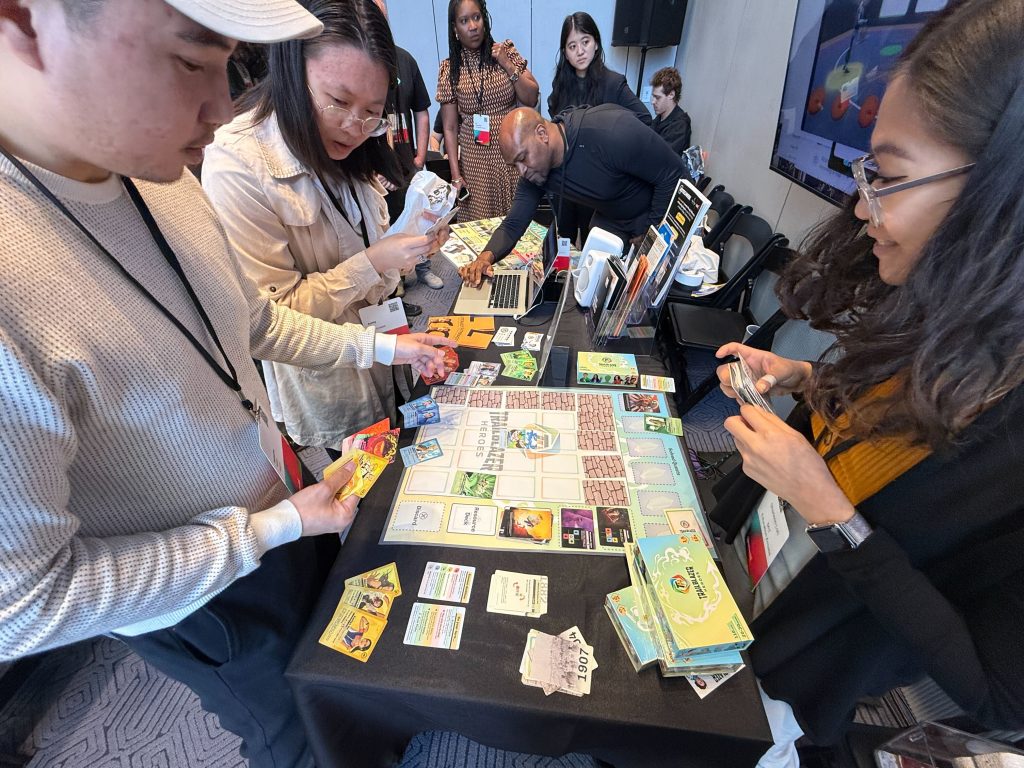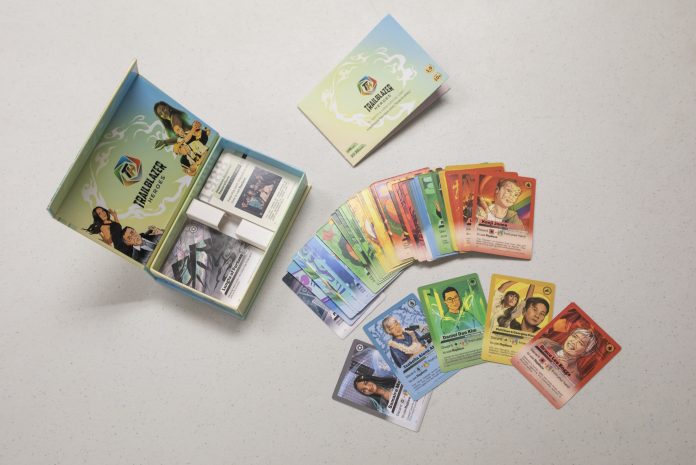by Ruichen Ge, AsAmNews Intern
In a time when representation and inclusivity are more crucial than ever, a dedicated team from Teachers College, Columbia University, has created a pioneering educational tool to celebrate Asian American and Pacific Islander (AAPI) heritage.
Trailblazer Heroes, a cooperative card game developed under the guidance of Professor Joey Lee, aims to empower young people by sharing positive examples of AAPI contributions and inspiring them to become trailblazers themselves.
A Vision Born from Necessity
Professor Joey Lee, Director of the Games Research Lab and Coordinator of the MA Program in Design and Development of Digital Games at Columbia, recognized a significant gap in the educational landscape regarding AAPI history and representation.
“Our goal isn’t merely to combat the anti-Asian hate that escalated during the COVID-19 pandemic,” he explained. “We want to share positive examples and inspire young people to do something meaningful, to break harmful stereotypes. This game is about celebrating Asian American heritage, diversity, and representation.”
The urgency of this mission is underscored by startling statistics: only 20 U.S. states mandate the teaching of AAPI history, and a mere 1.6% of universities offer AAPI studies programs. Trailblazer Heroes seeks to address this educational disparity by providing an engaging platform that integrates learning with play.
Game Design: A Collaborative Effort Reflecting Diversity
The development of Trailblazer Heroes was a team effort involving students, faculty, and professionals from various backgrounds. One of the unique aspects of the game’s development was the emphasis on inclusive art styles.
“Artistic representation was crucial,” Professor Lee noted. “Different groups wanted to be represented in ways that felt authentic to them. We had extensive discussions and negotiations to ensure that the visual design of the cards resonated with the diverse cultures within the AAPI community.”
Trailblazer Heroes features 20 heroes across five categories in its first edition, encompassing both historical figures and modern-day icons. The categories include pioneers in science, art, technology, journalism, and politics, reflecting the multifaceted contributions of the AAPI community.
The game employs various card types—Heroes, Friends (spirit animals), Events, Food/Artifacts, and Quests—to create a rich, interactive experience. Players work collaboratively to overcome challenges, combat stereotypes, and celebrate achievements, embodying the game’s core message that anyone can be a trailblazer.
Event cards highlight significant moments in AAPI history, such as the 1871 Los Angeles Chinese Massacre and the 1942 Japanese incarceration, underscore the resilience of AAPI communities and offer players an opportunity to engage with history while striving to overcome obstacles together.
Empowering Through Education and Play
Trailblazer Heroes was also designed to be an educational tool. The development team is particularly focused on integrating the game into educational settings.
“We hope teachers will use this game to teach AAPI history,” Professor Lee said. “It’s designed to be accessible for players aged 10 and up, making it suitable for classrooms and family game nights alike.”
The game addresses the lack of representation in educational curricula by providing an interactive way to learn about significant figures and events in AAPI history. By engaging with the game, players gain insights into cultural heritage, historical challenges, and the contributions of AAPI individuals who have shaped society.
Student Perspectives: Inspiring Future Trailblazers
Student involvement has been integral to the game’s development. Maria Sultana, a member of the game development team who contributed to game design, shared her experiences:
“The most rewarding part of working on this project is bringing awareness to the rich diversity within the AAPI community,” Sultana said in an interview with AsAmnews. “By exploring historical events, culture, food, and remarkable individuals, we celebrate the uniqueness of every culture. I hope this inspires more people to learn about and appreciate all the vibrant cultures within the AAPI community and reminds us all that we are trailblazers in our own ways.”

Community Engagement and Social Outreach
An essential component of the project is its emphasis on community engagement. The development team has groups focused on marketing, social media, partnerships, and outreach. These efforts aim to build bridges with AAPI organizations, educators, and families to promote the game’s adoption.
“Spreading the movement is a key part of our mission,” Professor Lee emphasized. “We want to use games, social media, and other formats to connect people, share stories of our trailblazers, and support AAPI initiatives.”
Part of the game’s proceeds are directed toward supporting nonprofits such as Apex for Youth and the Gold House Arts Foundation, reinforcing the project’s commitment to reinvesting in the community.
The Game’s Broader Impact and Future Aspirations
Trailblazer Heroes has already made waves in the gaming and educational communities. The first edition was showcased at the GenCon conference, one of the largest tabletop gaming conventions, where it received enthusiastic feedback. Media coverage from outlets like ABC7 and NextShark has further amplified its reach.
The team is actively seeking partnerships and funding opportunities to expand the game’s impact.
“Our goal is to make the game more visible so that more states and educational institutions will incorporate AAPI history into their curricula,” Professor Lee stated. “We’re looking for partners who share our vision and can help us maximize our impact.”
Future plans include developing additional editions of the game to feature more heroes and cover a broader spectrum of experiences. The team is also exploring the possibility of digital versions to make the game more accessible.
A Message of Hope and Empowerment
At its core, Trailblazer Heroes is more than just a game. It serves as a reminder that representation matters and that sharing stories can inspire future generations. The game encourages players to see themselves in the heroes they admire and to recognize their potential to make a difference.
Professor Lee reflected on the project’s most rewarding aspects: “Seeing the impact the game has on players, especially young people, has been incredibly fulfilling. It’s inspiring to witness how engaging with the game can spark interest in AAPI history and encourage self-reflection about one’s role in the community.”
Join the Movement
For those interested in supporting Trailblazer Heroes, the team encourages reaching out for partnerships, sharing the game with educators and families, and spreading the word through social media.
“Together, we can make a significant impact,” Professor Lee concluded. “By celebrating our trailblazers and sharing their stories, we pave the way for future generations to forge their own paths and continue the legacy of making positive change.”
The game is available for purchase here. An educational game set for teachers is also available.
AsAmNews is published by the non-profit, Asian American Media Inc.
We are supported through donations and such charitable organizations as the Robert Wood Johnson Foundation. A big thank you to all our readers who supported our year-end giving campaign. You helped us not only reach our goal, you busted through it. Donations to Asian American Media Inc and AsAmNews are tax-deductible. It’s never too late to give.
Please also follow us on Instagram, TikTok, Facebook, YouTube and X.

